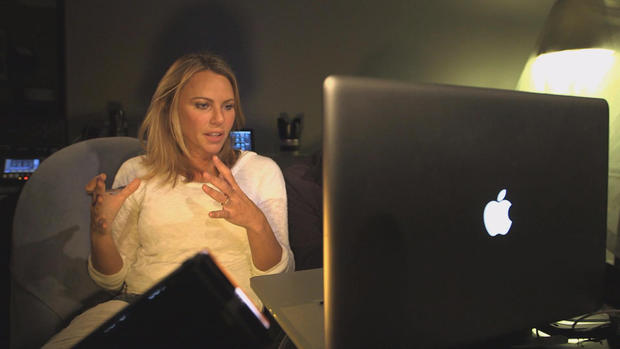Back from Liberia: 21 days in self-quarantine
"One thing that strikes you when you arrive in the country is that the first thing you see is Liberian workers in the airport who are wearing face masks, and some of them wearing aprons. Before you can enter the terminal building, you have to wash your hands with chlorine," recalls Lara Logan about arriving in Liberia for her 60 Minutes story on an American-run clinic set up to treat people with Ebola.
Logan spoke to 60 Minutes Overtime via FaceTime from a hotel room in South Africa, where she and her 60 Minutes colleagues are self-quarantined following their week-long reporting assignment in Liberia.
Geoff Mabberley, also part of the quarantine, traveled with the 60 Minutes team, but not as a journalist. His job was to make sure that Logan and the others did not come in contact with the disease.
"Geoff just watched us every minute of the day," Logan says. "[He] sprayed us with chlorine and disinfected everything: the drivers, the cars, the luggage - every time you got out, came out of somewhere."
As Mabberley explains his job: "I'm just constantly looking at what they're touching, where they're going, where they're standing, where they're moving . . . [and] try and protect them from that next move."
Mabberley also protected the team when they were away from the hospital by establishing their hotel as a safe zone, and insisting that everyone - including Logan, cameramen Massimo Mariani and Richard Butler, producer Max McClellan, and security personnel and drivers - stayed there.
The heart of Logan's report takes place in a clinic run by the American relief organization International Medical Corps. At this so-called "Ebola Treatment Unit," American doctors and nurses work alongside Liberian staff, trying to rescue men, women and children from a virus that has a 70 percent death rate in this region.
"We thought that the Americans who are working there -- who are with these people every day, who have chosen to be there -- could help bring to life the suffering of the Liberians through their own experiences," says Logan.
Logan -- a seasoned war correspondent who has reported extensively from Iraq and Afghanistan - says covering Ebola in Liberia "is very much like a war. You have to keep it together because that's your job, and you can't be here if you can't do that. But it's so heartbreaking. It's really been hard on all of us."
Logan recalls visiting the cemetery where the clinic buries those who couldn't fight back this virulent virus. "On the grave markers, instead of writing, 'Born and died,' the way you would in the U.S., the Liberians write, 'Sunrise and sunset' to mark a person's time on the earth," Logan says. "That, for us, was symbolic of the spirit of the people."
The above video was produced for 60 Minutes Overtime by Magalie Laguerre-Wilkinson and Craig Crawford.
Photos of Nurse Kelly Suter courtesy of International Medical Corps/Stuart J. Sia
